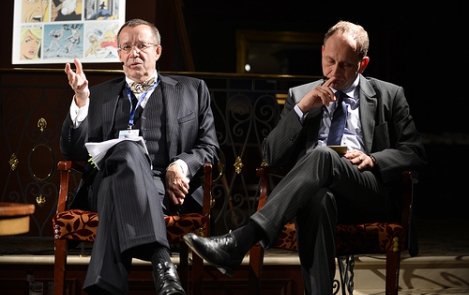-
Reset
+


President Ilves: anti-European populism may even begin to influence government policies in Northern Europe, which has so far been responsible
Saturday, 16 March 2013 13:19
The President, Toomas Hendrik Ilves, also gave a presentation at the opening day of the highly regarded foreign and security policy conference, Brussels Forum 2013; he participated in a discussion about the European economic crisis and cultural differences between northern and southern Europe.
As the countries with balanced economies tend to be a part of the northern, Lutheran cultural space, the people taking the floor at the conference were asked whether the current economic crisis could be a refection of differences between civilisation.
According to President Ilves, the different economic situation of European countries serves not as much to demonstrate the cultural gap between the South and the North, rather the haughty attitude of Western Europe towards Eastern Europe.
"While the East-European countries – such as, Estonia, Lithuania and Poland – have fulfilled all the rules and done everything to assist others, we can still see certain frightened concern about the East-Europeans," stated the Estonian Head of State.
He emphasised that the inconsistent compliance with rules and not the commands coming from Brussels is the main problem of democracy in Europe.
"While populism in South-Europe is a reaction to austerity measures, in North-Europe populism is caused by citizens who no longer agree with the decisions of governments to offer securities to countries that do not abide by rules that were adopted together," President Ilves said.
"Anti-European populism has more power in North-Europe than people perceive," he told. "Even if the populist movement does not make it to government level, they can have a material influence on policies and make it impossible to adopt regular political decisions."
"Europe will do well as long as the large political parties within the European Union Member States remain focused on Europe. But what should make us feel worried is the fact that anti-European sentiment has begun to spread among large political parties," told President Ilves. "If emerging political parties are more anti-European, we will face a serious problem in 10-15 years."
Cultural differences do not mean that finding common solutions is impossible, stated the Estonian Head of State. According to him, Europe needs institutions that work and more efficient supervision over compliance with common rules, as well as more open debate in the Member States about the situation in Europe.
The Estonian Head of State gave a presentation with the former Prime Minister of Italy, Francesco Frattini, influential delegate of the European Parliaments, Alexander Lambsdorff, and the former head of government of Greece, Georgios Papandreou. Historian Timothy Garton Ash, High Representative of the Union for Foreign Affairs and Security Policy, Catherine Ashton, and many others are among the presenters at Brussels Forum 2013.
Office of the President
Public Relations Department
Phone +372 631 6229




